The Brotherhood of the Cheerful Countenance (Flemish Legends) By Charles de Coster

I. Of the sorrowful voice which Pieter Gans heard in his garden, and of the flame running over the grass.
In the days when the Good Duke ruled over Brabant, there was to be found at Uccle, with its headquarters in the tavern of The Horn, a certain Brotherhood of the Cheerful Countenance, aptly enough so named, for every one of the Brothers had a wonderfully jolly face, finished off, as a sign of good living, with two chins at the least. That was the young ones; but the older ones had more.
You shall hear, first of all, how this Brotherhood was founded:
Pieter Gans, host of this same Horn, putting off his clothes one night to get into bed, heard in his garden a sorrowful voice, wailing: “My tongue is scorching me. Drink! Drink! I shall die of thirst.”
Thinking at first that it was some drunkard below, he continued to get into bed quietly, notwithstanding the voice, which kept crying out in the garden: “Drink! Drink! I shall die of thirst.” But this persisted so long and in so melancholy a manner that at last Pieter Gans must needs get up and go to the window to see who it might be making so much noise. Thence he saw a long flame, of great brightness and strange upstanding shape, running over the grass; and, thinking that it must be some poor soul from purgatory in need of prayers, he set about repeating litanies, and went through above a hundred, but all in vain, for the voice never ceased crying out as before: “Drink! Drink! I shall die of thirst.”
After cock-crow he heard no more, and looking out again he saw with great satisfaction that the flame had disappeared.
When morning came he went straightway to the church. There he told the story of these strange happenings to the priest, and caused a fair mass to be said for the repose of the poor soul; gave a golden peter to the clerk so that others might be said later, and returned home reassured.
But on the following night the voice began its wailing anew, as lamentably as if it were that of a dying man hindered from dying. And so it went on night after night.
Whence it came about that Pieter Gans grew moody and morose.
Those who had known him in former days, rubicund, carrying a good paunch and a joyous face, wont to tell his matins with bottles and his vespers with flagons, would certainly never have recognized him.
For he grew so wizened, dried up, thin, and of such piteous appearance that dogs used to start barking at the sight of him, as they do at beggars with their bundles.
II. How Jan Blaeskaek gave good counsel to Pieter Gans, and wherein covetousness is sadly punished.
It so happened that while he was moping after this fashion, passing his days in misery and without any joy of them, alone in a corner like a leper, there came to the inn a certain Master Jan Blaeskaek, brewer of good beer, a hearty fellow, and of a jovial turn of mind.
This visitor, seeing Pieter Gans looking at him nervously and shamefacedly, wagging his head like an old man, went up to him and shook him: “Come,” said he, “wake up, my friend, it gives me no pleasure to see thee sitting there like a corpse!”
“Alas,” answered Pieter Gans, “I am not worth much more now, my master.”
“And whence,” said Blaeskaek, “hast thou gotten all this black melancholy?”
To which Pieter Gans made answer: “Come away to some place where none will hear us. There I will tell thee the whole tale.”
This he did. When Blaeskaek had heard to the end he said: “’Tis no Christian soul that cries in this manner, but the voice of a devil. It must be appeased. Therefore go thou and fetch from thy cellar a good cask of ale, and roll it out into the garden, to the place where thou didst see the flame shining.”
“That I will,” said Pieter Gans. But at vespers, thinking to himself that ale was precious stuff to set before devils, he put instead in that place a great bowl of clear water.
Towards midnight he heard a voice more sorrowful than ever, calling out: “Drink! Drink! I shall die of thirst.”
And he saw the bright flame dancing furiously over the bowl, which was suddenly broken with a loud report, and this in so violent a manner that the pieces flew up against the windows of the house.
Then he began to sweat with terror and weep aloud, saying: “Now ’tis all over, dear God, all over with me. Oh, that I had followed the advice of the wise Blaeskaek, for he is a man of good counsel, of excellent counsel! Master Devil, who are so thirsty, do not kill me to-night; to-morrow you shall drink good ale, Master Devil. Ah, ’tis ale of fair repute throughout the land, this ale, fit for kings or for good devils like yourself!”
Nevertheless the voice continued to wail: “Drink! Drink!”
“There, there! Have a little patience, Master Devil; to-morrow you shall drink my best ale. It cost me many a golden peter, my master, and I will give you a whole barrelful. Do you not see that you must not strangle me to-night, but rather to-morrow if I do not keep my word.”
And after this fashion he wept and cried out until cock-crow. Then, finding that he was not dead, he said his matins with a better heart.
At sun-up he went down himself to fetch the cask of ale from his cellar, and placed it in the middle of the grass, saying: “Here is the freshest and the best drink I have; I am no niggard. So have pity on me, Master Devil.”
III. Of the songs, voices, mewlings, and sounds of kisses which Pieter Gans and Blaeskaek heard in the garden, and of the brave mien wherewith Master Merry-face sat on the cask of stone.
At the third hour Blaeskaek came down and asked for news. Pieter Gans told his tale, and as he was about to go away again drew him aside and said: “I have kept this secret from my servants, lest they should go and blab about it to the priests, and so I am as good as alone in the house. Do not therefore leave me, for it may happen that some evil will come of the business, and ’twould be well to have a good stomach in case of such event. Alone I should certainly have none, but together we shall have enough for both. It would be as well, then, to fortify ourselves against this assault on our courage. Instead of sleeping we will eat and drink heartily.”
“For that,” said Blaeskaek, “I am as ready as thou.”

The Little Stone Boy
Towards midnight the two comrades, tippling in a low room, fortified with good eating, but not without some apprehension nevertheless, heard the same voice outside, no longer sorrowful, but joyous, singing songs in a strange tongue; and there followed divers sweet chants, such as angels might sing (speaking with proper respect to them all), who in Paradise had drunken too much ambrosia, voices of women celestially soft, mewlings of tigers, sighs, noise of embraces and lovers’ kisses.
“Ho, ho!” cried Pieter Gans, “what is this, dear Jesus? They are devils for a certainty. They will empty my cask altogether. And when they find my ale so good they will want more of it, and come crying every night and shouting louder than ever: ’Drink! Drink!’ And I shall be ruined, alas, alas! Come, friend Blaeskaek”—and so saying he pulled out his kuyf, which is, as you may know, a strong knife well sharpened—“Come, we must drive them off by force! But alone I have not the courage.”
“I will come with you,” said Blaeskaek, “but not until a little later, at cock-crow. They say that after that hour devils cannot bite.”
Before the sun rose the cock crew.
And he had, that morning, so martial a tone that you would have thought it a trumpet sounding.
And hearing this trumpet all the devils suddenly put a stop to their drinking and singing.
Pieter Gans and Blaeskaek were overjoyed at that, and ran out into the garden in haste.
Pieter Gans, hurrying to look for his cask of ale, found it changed into stone, and on top of it, sitting horseback fashion, what seemed to be a young boy, quite naked, a fair, sweet little boy, gaily crowned with vine-leaves, with a bunch of grapes hanging over one ear, and in his right hand a staff with a fir-cone at the tip, and grapes and vine-branches twined round it.
And although this little boy was made of stone, he had all the appearance of being alive, so merry a countenance had he.
Greatly alarmed were Gans and Blaeskaek at the sight of this personage.
And fearing both the wrath of the devil and the punishment of the Church, and swearing together to say no word about it to any one, they put the figure (which was but a few thumbs high) in a dark cellar where there was no drink kept.
IV. Wherein the two worthy men set out for Brussels, capital city of Brabant, and of the manners and condition of Josse Cartuyvels the Apothecary.
Having done so much they set out together for Brussels, there to consult an old man, apothecary by trade, something of a glutton, but liked well enough by the common folk on account of a certain hotch-potch he made, well seasoned with rare herbs, for which he asked a not unreasonable price. He was reputed by the devout to have commerce with the devil, on account of the miraculous cures which he effected in both man and beast by means of his herbs. Furthermore, he sold beer, which he bought from Blaeskaek. And he was hideous to look at, gouty, wizened, yellow as a guinea, wrinkled as an old apple, and with carbuncles on his neck.
He lived in a house of mean appearance, in that part where you may now see the brewery of Claes van Volxem. Gans and Blaeskaek, coming thither, found him in his kitchen, making up his stews.
The apothecary, seeing Gans in such a piteous melancholy state, asked him if he had some ill whereof he wished to be cured.
“He has nothing to be cured of,” said Blaeskaek, “save an evil fear which has been tormenting him for a week past.”
Thereupon they told him the whole story of the chubby-faced image.
“Dear God!” said Josse Cartuyvels, for such was the name of this doctor of stews, “I know this devil well enough, and will show you his likeness.” And taking them up to the top of his house, into a small room which he had there, he showed them a gallant image of that same devil, making merry with pretty maids and gay goat-foot companions.
“And what is the name,” said Blaeskaek, “of this merry boy?”
“I have no doubt it is Bacchus,” said Josse Cartuyvels. “In olden times he was a god, but at the gracious coming of Our Lord Jesus Christ”—here all three crossed themselves—“he lost at once his power and his divinity. He was, in his time, good company, and more particularly notable as the inventor of wine, beer, and ale. It may be, on that account, that instead of hell he is only in purgatory, where no doubt he has become thirsty, and by God’s permission was allowed to return to earth, once only, no more, and there sing this lamentable song which you heard in your garden. But I suppose that he was not allowed to cry his thirst in countries where wine is chiefly drunk, and that he came accordingly to Master Gans, knowing well enough that with him he would find the best ale in all Brabant.”
“True,” said Gans, “true, friend Cartuyvels, the best in the duchy; and he drank up, if you please, a whole barrelful, without paying me so much as the smallest gold piece, nor silver, nor even copper. That is not the conduct of an honest devil.”
“Ah!” said Cartuyvels, “there you are in error, and do not perceive what is for your good and what for evil. But if you will take the advice I am about to give you, you may find a way whereby you can make clear profit from this Bacchus, for he is, you must know, the god of jolly drinkers and good innkeepers, and I am disposed to think that he will do you a good turn.”
“Well, then,” asked Blaeskaek, “what must we do now?”
“I have heard that this devil loves warmth and sunlight. So take him out, first of all, from this dark cellar. Then put him in some place whither the sun reaches, such as on top of the tall press which stands in the room where your customers sit and drink.”
“Sweet Jesus!” exclaimed Pieter Gans, “this is idolatry.”
“In no wise,” said the apothecary. “I mean only this; that, put up where I tell you, sniffing the good smell of stoups and flagons, and hearing jolly talk, he will grow altogether frolicsome and happy. So may you bring Christian comfort to poor dead souls.”
“But if,” said Pieter Gans, “the priests should get wind of this statue, so shamelessly set up for all to see?”
“They cannot find you guilty of sin, for innocence keeps nothing secret. You will show this Bacchus openly to all your friends and relatives, and say that you found him buried under the earth in a corner of your garden. Thus you will make him seem an ancient relic, as indeed he is. Only take care to forget his name when you speak of him to any one, and, entitling him, as in jest, Master Merry-face, use this name for him always, and institute in his honour a jolly brotherhood.”
“So we will,” answered Pieter Gans and Blaeskaek together, and they then departed, not without having given the apothecary two large coins for his trouble.
He did his best, however, to keep them back, so that they might partake of some of his heavenly hotch-potch, but Pieter Gans turned him a deaf ear, saying to himself that it was devil’s cooking, unwholesome for a good Christian stomach. So they left him and set out again for Uccle.
V. Of the long conversation and great perplexity of Pieter Gans and Blaeskaek in the matter of the deviling; and how they returned to Uccle with a resolution taken.
While they were on their way: “Well, comrade,” said Gans to Blaeskaek, “what is thy opinion of this apothecary?”
“A dog of a heretic!” said Blaeskaek, “a heathen, a despiser of all good and all virtue. For ’twas treasonable and wicked counsel he gave us.”
“True, my good friend, true. And is it not besides a great heresy to dare tell us that this deviling on his cask is he who invented beer, wine, and ale, when we have heard it preached every Sunday in our church that St. Noah, under the instruction of Our Lord Jesus Christ”—here both crossed themselves—“invented these things.”
“For my part,” said Blaeskaek, “I know I have heard that preached above a hundred times.”
Here, seating themselves on the grass, they began to refresh themselves with a fine Ghent sausage, brought by Pieter Gans against such time as they should feel hungry.
“There, there,” said he, “let us not forget the Benedicite, my friend. So, perhaps, we may escape burning. For ’tis to God we owe this meat: may he deign to keep us always in his holy faith.”
“Amen,” said Blaeskaek; “but, my master, between us we must certainly break up this wicked statue.”
“He who has no sheep fears no wolves. ’Tis easy enough for thee to talk comfortably of breaking up this deviling.”
“’Twould be a deed much to our credit.”
“But if he come back again to wail each night so piteously: ’Drink! Drink!’ And if he turn angry with me and cast spells on my beer and my wine, and make me as poor as Job! Nay, better follow the advice of the apothecary.”
“Aye, and if the priests learn of the statue, and call us both before the tribunal, and have us burnt as heretics and idolaters, what then?”
“Ah,” said Gans, “here are the good God on the one hand and the wicked devil on the other, fighting over our poor bodies, and we shall be pounded to nothing between them, alas, alas!”
“Well,” said Blaeskaek, “let us go to the good fathers openly, and tell them the whole affair.”
“Alas, alas! We shall be burnt, my good master, burnt without mercy.”
“I believe there must be some way whereby to escape this danger.”
“There is none, my friend, there is none, and we shall be burnt. I feel myself already half roast.”
“I have thought of a way,” said Blaeskaek.
“There is none, my friend, there is no way whatever, unless it be the clemency of the worthy fathers. Canst see no pilgrim or wandering friar on the road?”
“None.”
“If we see such a one we must give him all our sausage—have we said our grace for it?—and all the bread in our wallet, and humbly invite him into our house, to eat a quarter of roast lamb, well washed down with old wine. I have not much of that kind, but I will gladly give him all there is of it. Canst not see such a one coming?”
“No one,” said Blaeskaek. “But open those rabbit’s ears of thine and hark to me: I will give thee good counsel, for I wish thee well, blubberer. We must follow the apothecary’s advice in half-and-half fashion, so much only, you understand. ’Twould be idolatry of the most shameless kind to put up this statue in the public hall.”
“Alas, alas, by all the devils! yes, you are right.”
“Very well, then we will put him in a cupboard, which shall be well fastened, but with an opening on the top to let in the air. Therein we will also put a small keg of good beer, and ask him not to use it up too fast. In this way he will be, in fact, within the hall of the inn, and he will keep himself well hid for certain, for in his cupboard he will be able to take what pleasure he may from the songs of the drinkers, rattling of mugs, and clinking of bottles.”
“No,” said Gans to that, “no, we must follow wholly the apothecary’s advice, for he knows more about devils than we. As for this deviling, we will do our best to satisfy him, according to our means. But in spite of it all, I fear we shall one day be burnt, alas, alas!”
VI. Wherein it is seen that the devil is not a good one; and of the evil trick which he played on the good wives of the drinkers.
As soon as they reached The Horn, the two worthies took out from the cellar the statue of the deviling and put it with great respect on top of a press which stood in the hall.
On the morrow there came to this inn nearly all the men of Uccle, brought together in this wise because on that day had been sold publicly in their stables two horses well bred by the late sheriff, Jacob Naeltjens. His son was in no mind to keep them, saying that a man’s best steeds were his slipper-shoes.
The men of Uccle were surprised and delighted when they saw the statue of the youngster on the press, especially when Blaeskaek told them that his name was Master Merry-face, and that it was proposed, by way of jest, to establish forthwith in his honour a jolly brotherhood.
They were all willing to do this, and thereupon decided between them that no one should be of their brotherhood until he had drunk, as his baptism, four-and-twenty monstrous great cups of wine, while another brother beat twelve strokes on the plumpest belly of the company there present.
Each night thereafter they gathered together at The Horn, and drank deep enough, as you may well guess.
The most wonderful thing about the business was that in spite of this they worked all day like stout fellows, some at their crafts, some at their trades, others in the fields, contented one and all. But their good wives were not by any means contented, for as soon as vespers sounded all their husbands and sweethearts went off to The Horn, without giving them so much as a single thought, and there stayed until curfew.
And when these worthies went home they did not beat their wives, as some drinkers do, but lay down quietly beside them in bed, and immediately, without saying a word, fell fast asleep and began to sound such fanfares with their noses as Master Porker makes with his snout.
Then the poor women might thump them, cuff them, call their names as they would, to get them to sing their bedfellows a different sort of song, but all quite in vain: as well beat water to get fire out of it.
They awoke only with cock-crow, but their temper in the morning was so rough and stormy that none of their womenfolk (that is to say, of such as were not asleep from weariness) dared say a word, either then or at the dinner-hour. All this was brought about by the evil power and influence of the deviling.
On that account there was much sadness among the women, who said, all of them, that if such a state of things went on for long the race of the people of Uccle must needs become extinct, which would be a great pity.
VII. Of the Great Parliament of the Women of Uccle.
So it came about that the women decided between themselves to save the village from this fate, and to this end, while their menfolk were at drink with Pieter Gans, they met together at the house of a certain dame Syske, who was big, fat, loud-speaking, had hair upon her chin, and had buried five husbands, or else seven, I dare not particularize the number for fear of untruth.
There, as a rebuke to their drunken husbands, they quenched their thirst with clear water.
When all were present, the younger ones assembled on this side and the older on that, the ugly ones among the older, dame Syske opened the talk by saying that they must all go forthwith to The Horn, and there give these drinkers such a drubbing that they would be stiff and sore for a week because of it.
The old and ugly ones applauded this proposal with their hands, their feet, their mouths, and their noses. There was a fine noise, you may well believe.
But the young and pretty ones kept silent as fishes, all save one, very pretty, very fresh and very neat, bearing the name of Wantje, who said very modestly, and blushing somewhat, that it was of no use to belabour their worthy men in this fashion, but rather they must bring them back to good ways by gentleness and laughter.
To this the dame Syske replied: “Little one, thou canst understand nothing of men, for thou art but a maid, or so I believe. For my part I know well enough how I managed my several husbands, and that was neither by gentleness nor by laughter, I promise thee. They are all dead, the worthy men (may God rest their souls!), but I remember them clearly, and know very well that at the least wrongdoing I made them dance the stick-dance on the field of obedience. None dared eat or drink, sneeze or yawn, unless I had first given him leave. Little Job Syske, my last, did my cooking for me in my own house. He made a good cook, poor little man. But I had to give him many good beatings to bring him to that, and so it was with the others as well. Therefore, little one, give up all these laughters and gentlenesses of thine, they are not worth much, I can tell thee. Let us rather go forthwith and cut ourselves good staves of greenwood, easy enough to find now that it is spring-time, and going off to The Horn let us make fall a good shower of blows on these unfaithful husbands.”
At this the old and ugly ones broke out afresh into monstrous howls and tumult, crying, “Out upon them! out on the drunkards! They want a good drubbing, they want a good hanging!”
VIII. Of the great wit which every woman has, and of the modest conversation which the maid Wantje held with the worthies at the inn.
On the morrow all these good women met together once again, and drank as before a great quantity of clear water; and afterwards went off, armed with sticks, to the place where they knew their men were to be found.
Before the door of The Horn they stopped, and there a great council took place. The old ones wanted to go in with their sticks.
“No,” said Wantje, with the young and pretty ones, “we would rather be beaten ourselves.”
“Hark to these sillies!” cried the old ones, “these poor silly things. They have not an ounce of pride in their bodies, between the lot of them. Be guided by us, gentle ewekins: we will avenge the dignity of women for you upon these wretched drunkards.”
“That you shall not,” said the young ones, “as long as we are there.”
“That we shall,” howled the old ones.
But here a certain young and merry wife burst out laughing.
“See ye not,” said she, “whence comes to these grannies so great a rage and such a thirst for vengeance? ’Tis simple bragging, to make us believe that their old croakers of husbands still care to sing them songs.”
At these words the old hags were thrown into such a state of fury that one or two died of rage there and then. Others, having quite lost their heads, wanted to kill the maids and young wives who were laughing at them (and ’twas pretty music, all those fresh and merry voices), but the dame Syske stopped them from that, saying that for the present they must take counsel together and not kill one another.
Continuing their discussion, they quarrelled, argued, chattered, jabbered in this and like fashion until curfew-time, when they separated without having made up their minds to anything, by reason of not having had time enough to talk it over.
And there were spoken in this assembly of women more than 877,849,002 words, each one as full of good sense as a cellarful of old wine.
Pieter Gans, who, as they said, had rabbit’s ears, hearing in the street a certain hum of chattering voices, cried out: “Alas, alas! what is this now? Devils for a certainty, dear Jesus!”
“I will go and see, little coward,” answered Blaeskaek. But on opening the door he burst out laughing all at once, saying: “Brothers, ’tis our wives.”
Thereupon all the drinkers rose and went to the door; some with bottles in their hands, others brandishing flagons, others again clinking their mugs together like church bells. Blaeskaek went out of the room, crossed the threshold of the outer door, and stepped into the street.
“Well, wives,” said he, “what brings you here with all this greenwood?”
At these words the young ones let fall their sticks to the ground, for they were ashamed to be caught with such weapons.
But one old woman, brandishing hers in the air, answered for the others: “We come, drunkards, to tell you the tale of the stick, and give you a good thrashing.”
“Woe, woe!” wept Pieter Gans, “that, I know, is my grandmother’s voice.”
“So it is, scoundrel,” said the old woman.
Meanwhile the Brothers of the Cheerful Countenance, hearing all this, shook their sides merrily with laughing, and Blaeskaek said: “Then come in, come in, good wives, and let us see how you do your drubbing. Are those good greenwood staves you have brought?”
“Yes,” said they.
“I am glad of that. For our part we have ready for you some good rods, well pickled in vinegar, which we use for whipping disobedient boys. ’Twill doubtless give you all sweet pleasure to feel their caresses, and so recall the days of your youth. Will you be pleased to try them? We will give you plenty.”
But at these scoffing words the old women took fright and ran off as fast as their legs would carry them, more particularly mother Syske, making such terrible threats and noises as they went that they sounded to those jolly Brothers like a flight of screeching crows passing down the deserted streets.
The young ones stayed before the door of the inn, and ’twas affecting to see them so humbly standing, gentle and submissive, waiting for some kindly word from their husbands or sweethearts.
“Well,” said Blaeskaek, “do you please to come in?”
“Yes,” said they all.
“Keep them out,” said Pieter Gans into Blaeskaek’s ear, “keep them out, or they will go chattering to the priests about the deviling, and we shall be burnt, my good friend.”
“I am deaf,” said Blaeskaek; “come in, my dears.”
Thereupon entered all these good women, and took up their places, some by their husbands, others by their sweethearts, and the maids in a line on a bench modestly.
“Women,” said the drinkers, “you wish to join us?”
“Yes,” said they.
“And to drink also?”
“Yes,” said they.
“And have not come here to tell us temperance stories?”
“Nay,” said they, “we have come without any other wish than to join our good husbands and sweethearts, and laugh with them, if that may be, with God’s good will.”
“Those are certainly fair words,” said one old man, “but I suspect beneath them some woman’s artifice or other.”
But no one paid him any heed, for by this time the women were seated all about the table, and you might hear this: “Drink this, pretty sweet, ’tis a draught from heaven.” “Pour, neighbour, pour, pour out some more of this sweet drink.” “Who is a better man than I? I am the Duke; I have good wine and good wife!” “Ho, there! broach a fresh cask of wine; we must have the best there is to-day to pleasure these good dames.” “Courage! I have drunk too much; I am going to conquer the moon. But wait a little first. For the present I stay by this good wife of mine. Kiss me, sweet.”
“This is not the place, before all these people,” the women would answer. And with many caresses and pretty ways each said to her man: “Come away home.”
They would indeed have been glad enough to go, all those good drinkers, but did not dare do it, being shamefaced in this matter in one another’s presence.
Guessing as much, the women talked of going back.
“There, there!” said the old man, “is not that what I said. They want to have us outside.”
“Nay, my masters,” said Wantje very sweetly, “but I pray you remember that we are not accustomed to such strong drinks, nor even to their smell. Therefore, master, if we feel the need to go out into the fresh air ’tis assuredly without wanting to anger or sadden you in any way whatsoever. May God keep you merry, brothers.”
And thereupon the good women went off, though the men tried to keep them back by force.
IX. Wherein it is seen that the learned Thomas a Klapperibus knew what makes a drinker fidget on his stool.
Left thus to their pots and tankards they turned to one another in wonder, saying: “Ah, look ye at these dames! Does it not always fall out in this wise; that they would have us do whatever they bid, and that with humility! Submissive they seem, tyrants they are. But look ye, is it to male or female that belongs properly the right of command in all matters? To the male. We are the males. Very well, then, let us drink! And we will at all times carry out our own wishes, which will presently be to sleep here in this inn, if we please.”
After this fashion they talked together for some time, feigning great anger, but being, in fact, eager enough to go and join their wives. By and by they fell silent, and so remained for a while, some yawning, others drumming tunes on the floor with their boots, others again, and these many, fidgeting on their seats, as if they were on sharp thorns.
Suddenly a young townsman, but lately married, got up and left the hall, saying that by the advice of a leech he was forbidden to drink more than six-and-twenty mugs of ale, which number he had already taken.
After he had gone they all began to excuse themselves, one with a pain in his stomach, another with a headache, others with a melancholy feeling or with the phlegm, and made off to their homes, excepting only one or two among the older men.
And when they were once outside they hurried with all speed to join their wives. Thus was borne out what was written by the learned Thomas a Klapperibus in his great work De Amore, c. vi, wherein it is said, that woman has more power than the devil.
X. Of the brigand called Irontooth.
But this thing never happened but once; for on the morrow when the drinkers were carousing at The Horn the good women who came thither to entice them away a second time were driven off in a shameful manner.
And as for the men, they continued to drink and to shout hilarious carols.
Several times the night-watchman of the town came in to warn them against making so much noise after the sun was set. Ha, they listened to him with all respect, and seemed quite abashed and repentant at their fault; each one said his mea culpa; and in the meantime they gave the poor watchman so abundantly to drink that when he got outside he went off straight away to do his round leaning against some wall, and there snoring like a bass-viol. The others continued their drinking bouts and heavy slumbering, whereof the unhappy wives never ceased to complain. And so on, in this fashion, for a month and four days.
Now by great misfortune the good Duke had lately been at war with my Lord of Flanders, and although peace had been made between them there remained afoot a band of lewd and ribald scoundrels, who went about ravishing all the countryside and robbing the townsfolk.
This same band was commanded by a savage captain, to whom was given the name of Irontooth, because on the top of his casque he wore a single spike, sharp and cruel, like the tooth of some devil or of one of the unicorns of hell, cut out into fantastic shape. In battle he would sometimes put down his head and use this tooth as a wild boar uses his tusks. In this manner were slain many brave soldiers of the duchy of Brabant. On this same casque he carried also an evil bird whose wings beat against the steel, whereof it was said that it screeched in battle in a terrible fashion.
It was Irontooth’s custom to come at night to the villages on which he was minded to carry out his forays, butchering without mercy the poor townsfolk in their sleep, and carrying off jewels, plate, women, and maids, but of these last only the young ones. As for the old women, he left them their lives, saying that it was not worth the while of killing them, for they would certainly die of fright by themselves.#
XI. In which it is seen how bravely the good wives of Uccle did the duty of men.
It came about that one night when only a few stars were showing, and the moon shining a little, there came to Uccle a certain Master André Bredael, running as hard as he could and quite out of breath.
He brought this news: that being by chance behind a bush on the road to Paris, he had seen a troop of men go past, whom he thought to be the Irontooth’s, for he had seen among them a spiked casque like that which the great brigand was wont to wear.
While these men were halted by the roadside, and munching some food, he overheard them say that they were bound that night for Uccle, where they hoped to get good sport and fair plunder, but they said also that they must leave the high road and travel by small lanes, so that their passage should not be discovered. Master Bredael thought it most likely that they would debouch behind the church.
Having learned so much he had hurried to Uccle by the Paris road, outdistancing the brigands by a good half-league, so that he might warn the townsmen to arms, and prepare a strong reception for these unwelcome travellers.
And arriving there he hastened to the door of the prefecture and knocked loudly, so that the warning bell might be set ringing at once; but none came to open to him, for the good reason that the custodian, being one of the Brothers of the Cheerful Countenance, was fast asleep, like all the other drinkers. André Bredael then sought other means of alarum, and shouted out so loudly: “Fire! fire! Brand! brand!” that all the women and old men, and children who were too young to drink, leapt out of bed and ran to their windows to see what was going forward.
André Bredael made himself known to them and begged them to come down into the square, which they did with all dispatch. When they were all gathered round him he told them of the coming of Irontooth, and bade them go and wake their husbands.
At these words the older women began to shout as if mad: “Welcome to Irontooth, God’s tooth in good deed, come to rip them all open! Ha, drinkers! now we shall see you, as a punishment from heaven, either hanged short or burnt alive or drowned without respite; and ’tis no more than your sins deserve!” Then, as if they had wings to their feet, they flew into their houses, and there Master Bredael, who stayed with the younger women in the square, heard the enraged old hags shouting, whining, weeping, vociferating, thumping on chests and frying-pans, in an attempt to awaken their good men. At the same time they cried in their ears: “Scoundrels, wake up! Sweet friends, come and protect us! Drunkards, do your duty for once in your accursed lives! Dear fellows, do you wish to find us dead by morning? Bear us no malice for our talk of thrashing you. We were foolish just then, and too hasty; ye were wise. But save us in this pass!” And so on, mixing together smooth and bitter words, like milk and vinegar.
But none of the men stirred.
“What is this?” said Master Bredael.
“Alas, master,” said the young women, “’tis as you see; they are as good as dead the night through, and so has it been a while past. If the angel of God himself were to come he would scarce be able to rouse them. Ah, must it be that after having left us lonely so long these wicked husbands will now leave us to die!”
“Do not weep,” said André Bredael, “this is no time for that. Do you love these husbands of yours?”
“Yes,” said they.
“And your sons?”
“Yes,” said they.
“And your little daughters, so sweet and winsome?”
“Yes,” said they.
“And you are ready to defend them as best you can?”
“Yes,” said they.
“Well, then,” said Bredael, “go and fetch your men’s bows and come back here with them as quickly as you can. We will think of some way to defend ourselves.”
Soon enough the women were back again, armed with bows which they had taken from their husbands, brothers, or sweethearts. These bows of Uccle were of great renown throughout the land, for they were as strong as steel, and winged their arrows with very great speed.
With them came certain boys of twelve years old, or not much more, and one or two brave old men, but the women sent them back again indoors, saying that they must stay behind and look to the village.
The good womenfolk then collected in a bunch in the square, talking with great ardour and courage, but not too much bragging withal. Every one was clad in a white gown, jacket, or shift, as is the customary night apparel of women. But on this occasion it was by the special favour of God that they were so clad, as you shall see by and by.
Wantje, who was one of their number, standing very bold and calm, said suddenly that they must pray. Thereupon they all knelt devoutly, and the maid spoke thus:
“Madam Mary the Virgin, who art queen of heaven as Madam the Duchess is queen of this country, give an ear to these poor wives and maids, humbly kneeling before you, who by reason of the drunkenness of their husbands and brothers must needs take on themselves men’s duty and arm themselves to fight. If you will but make a small prayer to My Lord Jesus to give us his aid we shall be sure enough of victory. And we will give you as thanksgiving a fair crown of gold, with rubies, turquoises and diamonds in its rim, a fair golden chain, a fair robe of brocade spangled over with silver, and the same to My Lord your son. Therefore pray for us, Madam Mary.”
And all the other good maids and wives said after Wantje: “Pray for us, Madam Mary.”
Suddenly, as they were rising from their knees, they saw a beautiful bright star shoot from heaven to earth, not far from where they were. This was, no doubt, an angel from the good God, who came down from Paradise in this guise, to stand beside them and help them the more surely.
Seeing the sign the good women took heart of grace, and Wantje spoke further, saying:
“Madam the Virgin hearkens to us, ’tis certain. Let us now proceed to the gate of the village, beside the church of Our Lord, who dwells therein”—here all crossed themselves—“to await with confidence the coming of the Irontooth and his men. And when we see them near at hand let every woman draw her bow, without speaking, nor moving in any way. Madam the Virgin will guide the arrows.”
“Well spoken, brave maid,” said Master Bredael. “Come, I see in those eyes of thine, so bright in the darkness, the breath of God, which is a flame, alight in thy maid’s heart. We must do as she says, good wives.”
“Yes, yes,” said they.
This woman’s army took up its place in line in the alley behind the church.
After a while of waiting, wherein was much perplexity and anxiety, they heard the sound of footfalls and voices, growing louder as they listened, as of men on the march.
And Wantje said: “Madam Mary, they are coming; have pity on us!”
Then a large body of men appeared before them, carrying lanterns. And they heard a monstrous, husky, devil’s voice crying: “Out, friends, out upon them! Loot for the Irontooth!”
But here suddenly all these good women let fly their arrows with great precision, for though they themselves remained in darkness they could see the brigands, all lit up by their lanterns, as clearly as in daylight. Two hundred of the men fell at the first volley, some with arrows in their skulls, others in their necks, and several with them in their bellies.
The Irontooth himself was among the first that the good women heard fall with a great thud, from an arrow let fly by Wantje, which pierced him through the eyeball neatly.
Some were not wounded at all, but, having troubled conscience, thought when they saw all these white figures that ’twas the souls of those whom they had made pass from life into death, come back by God’s grace to avenge themselves upon them. So they fell on their faces in the dust, as if dead from fear, crying out in a most piteous manner: “Mercy, Lord God! send back to hell all these ghosts, we pray you.”
But when they saw the good wives bearing down on them fear put strength into their legs, and they made off as fast as they would carry them.
XII. Wherein Pieter Gans is nearer the stake than the wine-barrel.
When the enemy had been so far discomfited the women came back into the square and stood before the prefecture, not feeling any glory, but rather sadness at having had to shed Christian blood in this manner. Ah, they returned thanks with a full heart to Our Lady the Virgin and Our Lord Jesus, who had given them the victory.
Nor did they forget in their thanksgiving the good angel who had come to their assistance in the form of a bright star. And they sang fair hymns and litanies very sweetly.
Meanwhile all the cocks in the countryside awoke one by one and heralded with their clarions the new day about to dawn.
And at that call, all the drinkers were roused from sleep, and ran to their doors to find out whence came this sweet music.
And my lord the Sun laughed in the sky.
And the worthy men came out into the square, and some of them, when they saw their wives in the assembly, were all for beating them because they had left their beds; but André Bredael interposed and told them the whole story. Thereupon they were all amazed, ashamed, and repentant, seeing how well these brave petticoats had striven on their behalf. Pieter Gans, Blaeskaek, and Father Claessens, Dean of Uccle, a most saintly man, also came out into the square.
Thereupon, seeing all this crowd assembled, Master Bredael spoke thus:
“Friends,” said he, “you hear how that ’tis through the valour of your wives and daughters alone that you are not by this time sniffing the air of heaven. Therefore ’tis seemly that here and now you should promise, and take oath to it, not to drink any more except by their wish.”
“That is all very well, Master Bredael,” said one of the townsmen, “but ’tis not plain drinking that puts us all into so deep a sleep. I speak of these things with knowledge, I who have drunk wine freely all my life, and hope still so to do with relish to the end of my days. There is something else to it, devilry and evil spells, or so I think. Come hither, Pieter Gans, come hither and talk to us somewhat, and if thou know anything, bring light to this dark matter.”
“Alas, alas!” said Pieter Gans, his head wagging and his teeth chattering (for he was afraid, poor fellow), “alas, alas! I know nothing, my good friends.”
“Nay,” said the man, “but thou dost know something of it, for I see thy head shaking and thy teeth chattering.”
But at this point the Dean confronted Gans:
“Wicked Christian,” said he, “I can see well enough thou hast had commerce with the devil, to the great despite of all these good men. Confess thy sin with all humility, and we will accord thee such grace as may be, but if thou deny it, thou shalt be punished with hot oil.”
“Ah,” said Pieter Gans in tears, “’tis as I said; I shall be burnt, dear God! Blaeskaek, where art thou, my good friend? Give me thy help. Alas, alas!”
But Blaeskaek had gone off in a hurry from fear of the holy Fathers.
“Ah,” said Pieter Gans, “see how the traitor deserts me when danger threatens!”
“Speak,” said the very reverend Father.
“Yes, Master Dean,” said Pieter Gans, weeping and wailing, “I will tell you the whole story, without keeping back anything…. Master!” he cried when he had come to the end of his recital, “if you will not punish me too heavily, Master, I will give all my poor savings as a perpetual gift to the Church. I am a true Christian, that I vow, and no heretic. Moreover, I wish not to die until I have had sufficient time to do long and full penance. But have me not boiled in oil before I have had that time, I beg of you.”
“As to that,” answered the Dean, “we shall see. Now take us to the place where this devil is to be seen.”
By that time they were close to the church, and the priest went in to get therefrom some holy water before they started. Then all the men, women, and children of the village took their way to The Horn.
There the Dean demanded to see what had been the cause of those wicked spells which had been cast over so many worthy men, and Pieter Gans, with all humility, showed him the deviling, still smiling and holding his staff of vine-branches in his hand. And all the women, after looking at him for some time, said that he was very comely for a devil.
The priest first crossed himself, then, dipping his fingers in the holy water, anointed therewith the brow, breast, and belly of the statue, which thereupon, by the grace of God, crumbled into dust, and a sorrowful voice was heard saying: “Oi moi, ô phôs, tethnêka!”
And these words of the devil were explained by the priest to signify, in the Greek tongue: “Woe is me! Light! I die!”
XIII. Of the great wonder and astonishment of My Lord the Duke when he heard of the valour of the women of Uccle.
In the meantime the village sent to the Duke two trusty men, with a message to that high prince informing him in due order all that had occurred. These men met him already on his way to Uccle, for he had learnt by his runners the Irontooth’s design, and knowing full well where he would find him was coming against him at all speed with a strong force of horsemen.
As soon as the messengers saw who it was coming along the road they went down on their knees, but the good Duke would have none of this, and made them rise and walk at his stirrup.
Before they had gone far they reached the scene of the brigands’ discomfiture. At the sight of all those heaped-up bodies the Duke halted, greatly astonished and no less pleased. “And who,” quoth he, “has slain all these scoundrels in this wise?”
“Our womenfolk,” said one of the messengers.
“What is this thou’rt telling me?” said the Duke with a frown.
“Before God, My Lord,” said the man, “I will tell you the whole story.”
And so he did.
“Well,” said the Duke when he had done, “who would have thought it of these good wives? I will reward them well for it.”
So saying he caused the casque of the Irontooth to be taken up and carried away. This casque was to be seen for many years in the armoury of My Lord Charles, who had it guarded with the utmost care.
XIV. In what manner was instituted the Order of the Women-Archers of Uccle and of the fine reward which My Lord gave to the brave maid Wantje.
On entering Uccle the good Duke saw coming towards him a large body of people, and in their midst a man crying out in a most piteous voice: “Master! Master Priest! let me not be boiled!” To which the answer was: “We shall see.”
“Whence comes all this noise?” said the Duke.
But as soon as Pieter Gans saw who it was he ran towards him and threw his arms round his horse’s legs. “My Lord,” he cried, “My Lord Duke, let me not be boiled!”
“And why,” said the Duke, “should they boil one of my good men of Uccle?”
But the very reverend Father Claessens, stepping forward, told him the whole story with great indignation, while Pieter Gans continued to blubber alongside in a most melancholy fashion. And thereon followed such confusion, with the one weeping and groaning, the other denouncing and syllogizing, and each so vehemently, that the good Duke could not tell which to listen to.
Suddenly Wantje came forward out of the press, and, like Pieter Gans, cried: “Mercy and pity!”
“My Lord,” said the maid, “this man has sinned greatly against God, but only from simpleness of mind and a natural cowardice. The devil frightened him; he submitted to the devil. Pardon him, My Lord, for our sakes.”
“Maid,” said the Duke, “that was well spoken, and ’tis to thee I will hearken.”
But the very reverend Father: “My Lord,” said he, “forgets to think of God.”
“Father,” said the Duke, “I am not forgetful of that duty. Nevertheless I think he takes little pleasure in watching Christian fat smoke or a good man’s flesh boil, but likes rather to see men gentle and kind, and not giving their fellows penance to do. And on this day when Our Lady the Virgin has deigned to perform a miracle for our sakes I will not sadden her mother’s heart by the death of a Christian. Therefore none of the accused, neither this Pieter Gans nor any other there may be, shall this time go to the stake.”
On hearing this Pieter Gans burst out laughing like a madman, and began to dance and sing, crying out the while: “Praise to My Lord! I am not to be boiled. Brabant to the Good Duke!” And all the townsfolk called out after him: “Praise to My Lord!”
Then the Duke bade them be silent, and smiling:
“Well, dames,” said he, “who have this night done man’s work so valiantly, come hither that I may give you a man’s reward. First of all, to the bravest one among you I give this great chain of gold. Which is she?”
The good women pushed Wantje forward before the Duke.
“Ah,” said he, “’tis thee, sweet pleader. Wilt kiss me, though I be old?”
“Yes, My Lord,” said the maid. And so she did, notwithstanding that she was a little shamefaced over it.
And the good Duke, having hung the chain round her neck, spoke further in this wise:
“As for you all, good dames, who have this night so gallantly carried arms, I institute among you a most honourable Order, under the protection of Madam Mary the Virgin, and I direct that there shall be set up in this place a staff of a good length, and that each Sunday you shall come together here and draw the bow in archery, in memory of the time when with those bows you saved the lives of your husbands and children. And there shall be a fair crown of laurel and a fair purseful of golden peters, bright and new, to be awarded annually to the best archer of the year, and brought to her on a cushion by all the others together. And this purse will dower her if she be a maid, or, if she be a wife, will stand her in good stead against a time of famine.”
In this manner was instituted the Order of Women-Archers of Uccle, who still draw the bow like men every Sunday, under the protection of Our Lady the Virgin.



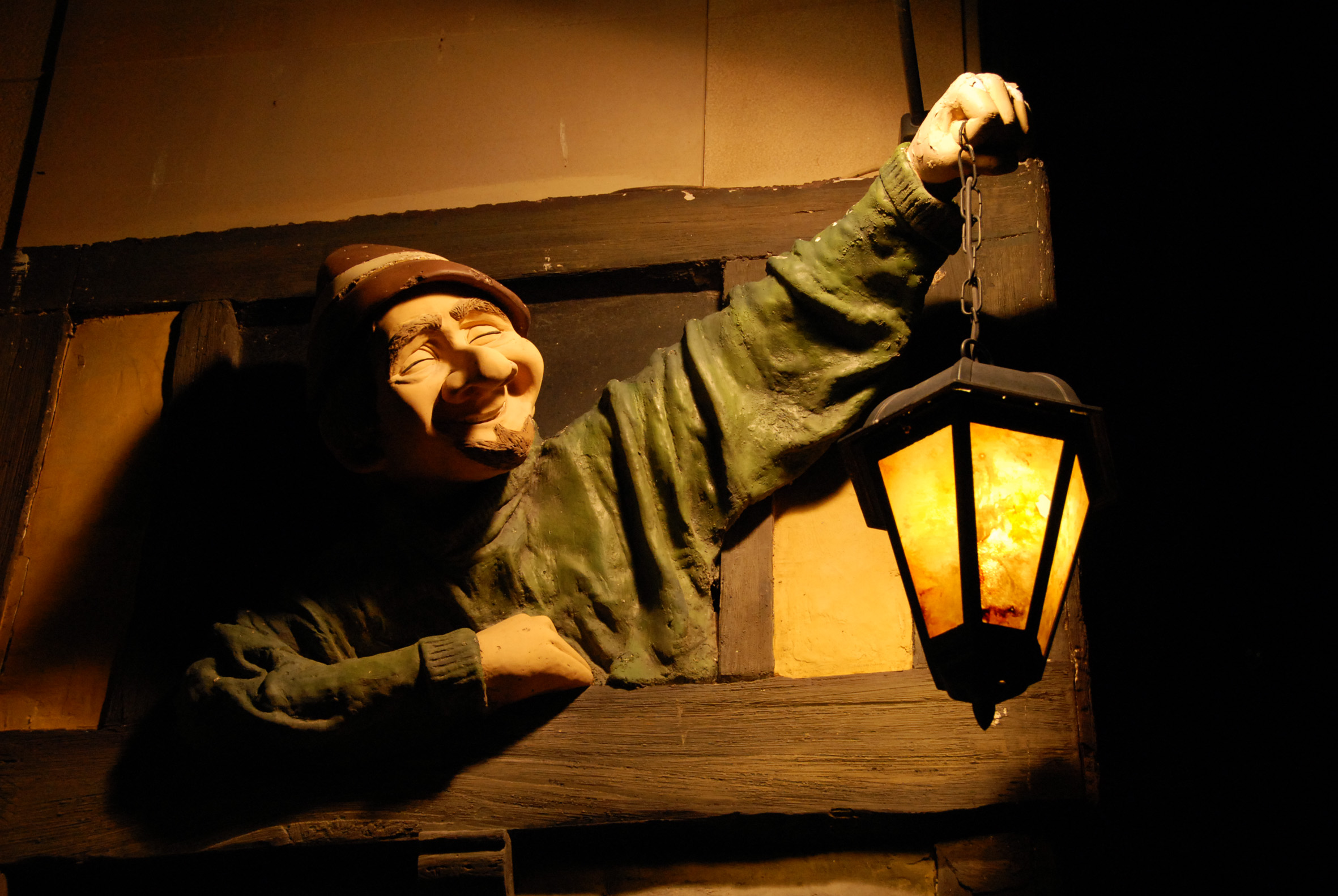
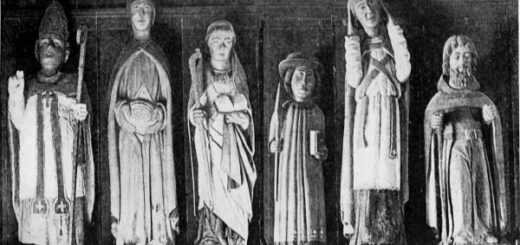


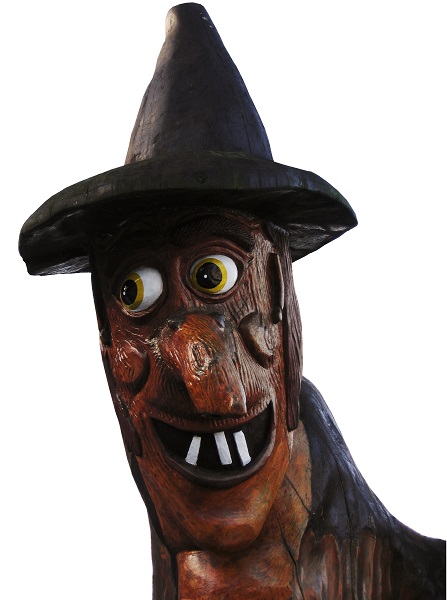


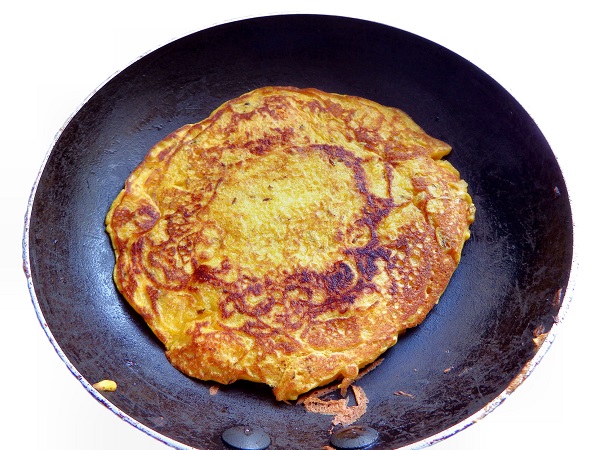



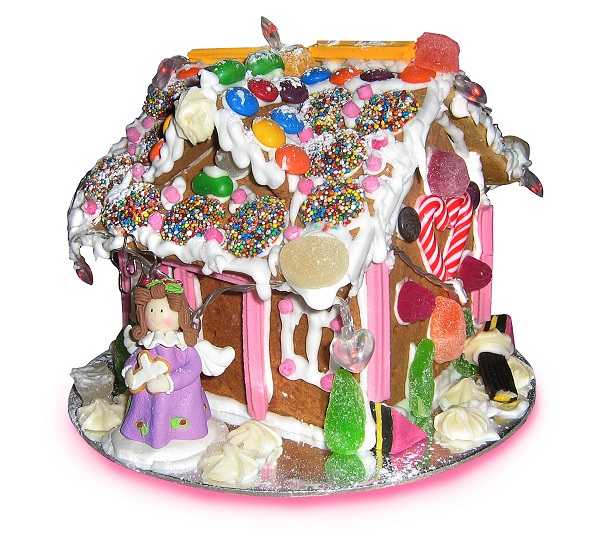
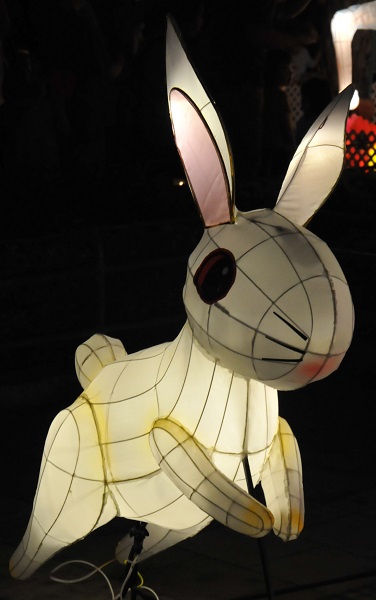

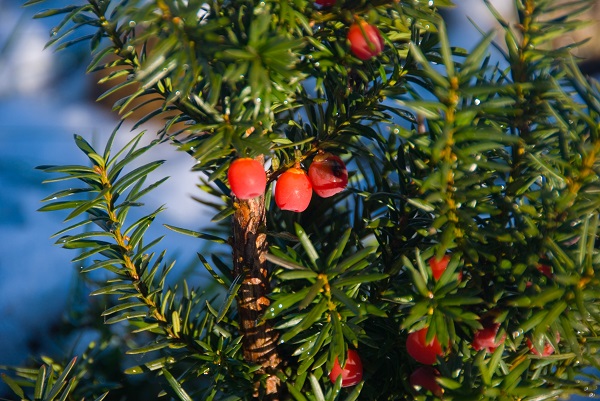
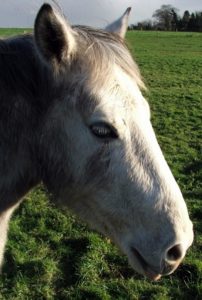
1 Response
[…] Finding a story representative for all of Belgium proofed difficult, because of the Belgium cultural diversity, or the Flemish-Walloon divide. I hope noone takes offence if I am going with a Flemish legend: The Brotherhood of the Cheerful Countenance […]